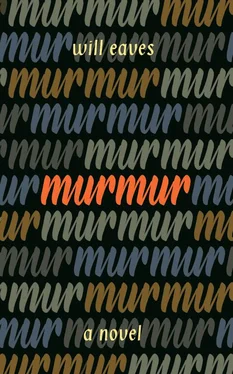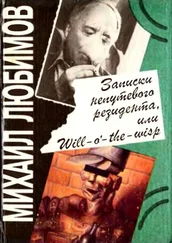Matron advances on the naked freak.
“I’m going to ask you some questions. Your answers may be right or wrong, halting or confident, knowingly false. Your task is to respond.”
As Stallbrook sets the terms—explains his test—she paddles fingers over a syringe, but settles for a swab of cotton wool and ethanol. What current of excitement shakes her hands? A trust in what she does, or has been asked to do?
“It is your interest in these questions that we prize,” the Colonel says. He moves his tie, palpates one side of his moustache, and scans the tree of life appearing in the cracked ceiling. “We wish to guard against a facile truth. We are hospitable to doubt, to fear, to the temptations of fancy. Try not to let your different… physical conditions deter you. Say simply what you think.”
The seasoned Molyneaux straightens his back and lays his hands upon his thighs, ready to play. He gives these mock-constraints credence. They are the rules he now obeys and in that moment of submission—while his companion stares agitatedly at me, searching for news, for sense (a last-minute reprieve, perhaps?)—chooses to overlook the shuddering of walls whose corners exhale dust, settle, but seem increasingly untrue.
A cry escapes the creature with brown hair and eyes, gray backward-sloping teeth, a dampened sex, and fat in hanging wads about his hips and chest.
“Such a great fuss,” Matron exclaims, wiping his upper arm.
Why does she pantomime her care? The freak communicates with me. A ripple in the air. Because, his houseless voice whispers, hers is a confusion of role and feeling she has long since lost. Surely my lake-dark vision is to blame, but now I see what’s wrong with my guardians. Their faces are unknown to them. Their eyes pure scar. They are the faces of people, or entities, to whom questions do not occur.
What will their questions be?
Matron inverts the vial of Stilboestrol and draws the fluid into her syringe. She draws too much—she sometimes stumbles upon generosity—and bites her lip, smiling. Depresses the plunger to bleed some drops… then, with a curious kind of voided puzzlement, but no self-consciousness at all, ignores the freak’s prepared deltoid and stabs his thigh instead.
His hands fly up. His body draws away at a steep angle from his leg so that he looks like someone squirming with embarrassment. White as the sky in cattle ponds. He briefly harmonizes with the squealing walls, and I remark on it, like this:
For I am mathematics and a page, the witness of a wilderness. I am the declined answer to all pain. A lake. A deer crossing the lake.
Somewhere, a mile above our heads, a red stag senses danger and abandons the reed bed. A glimpse of tusk, a scent: these are enough to warrant flight. Land is not safe. Water is risk. The perilous crossing confirms the life it takes away. The water is a strong master. I grip my prey.
The stag’s breath startles the surface, his snorting head a ragged system of vapor and spit. He needs to find the other shore; his antlers shake about their head-root like a brake of thorns. Everything acts on him, the cold, the deep, the motion of a boar’s tongue at the reed bed’s edge. He’s made by an unfeeling world, and yet how hard he swims. He bays at his reflection, not the picture of some imposed form but a form proposed by the moon and her reflected light.
I feel the animal’s shocked heart beneath my own. The force and course of change, the hormone spreading through his veins.
Deep down, below the wind-blown surface, in the box, the room from which nothing escapes, the Colonel asks, “Now, what is x ?”
*
Molyneaux shifts and coughs. He has been separated from his errant friend and brought back to the school. But illness and the night linger, their shame a bond. His body has functions and incapacities alike he scarcely can control.
He looks about him at the luxury of wood in Colonel Stallbrook’s Wargrave set, a suite facing the quad with lancet windows, bays, two ottomans, and pile carpet the color of young leaves throughout. The bronze-pinned steps up to the living room are empaneled on either side and bossed with quatrefoils. They bring a visitor into a long, high-ceilinged gallery of formal domesticity. Tall bookcases and heavy portrait frames look taller, heavier in the mullioned light.
The gowned master, sitting behind a desk, in silhouette against one of the shallow bays, rattles his cup in its saucer. He is accelerating with the earth.
“That’s better, Molyneaux.” He stops, and turns, frowning, into the sun. “Don’t be alarmed. I’ve no desire to punish you.”
The thought that there might be such a desire spins its quiet web.
“Foolish, to go along with Pryor’s schemes, no doubt—but that is punishment enough for now. For the future, we’ll see.”
The young boy takes a breath, and then one more, and tries to stretch his lungs against the pain. But Stallbrook sees. His voice changes. That hint of amateur theatricality, of clownish mascotry, that makes a master masterful is set aside.
“You’re going home today. Your parents will be here quite soon. I spoke to them this morning on the telephone. They are worried, of course.”
“I’m sorry, sir.”
“No, no. It’s clear to us you are—not well. But Molyneaux, aside from that, aside from, well, let’s call it pure bad luck… there is another matter I cannot ignore.”
The spider, in its spiral scheme, listens. Stallbrook assures his somber pupil of his confidence. This is a confidential chat, the runners’ pause before a race.
“It is for you to decide, now, how much of weakness your whole character will tolerate.” The Colonel frowns. “D’you see, I think a person with your gifts, your very, I may say… fraternal compassion for others, needs to be careful.”
“Please, sir.”
The boy is horribly ashamed, red-faced, adrift. Nothing like that, not anything . It was a dream—Deauville, the shelter and the bed. A temptation: unreal. His voice cracks, penitent, high-low, low-high, the amateur choir of youth.
“I make no excuses,” Stallbrook remarks. “Any small school, any small institution, tends to concentrate the joys and miseries of existence. Your kindness to Pryor’s a case in point. It is doubtless commendable. He is the sort to be picked on, let us be frank. It shows how difficult a very solitary life must be without loyal support. But you must think, a little, of your own claims on society.”
Molyneaux cannot hear the words—Stallbrook’s, his own—for blood, though their meaning is clear. He’s being asked to choose. Between two versions of himself. Two abstractions, or maybe one with two faces—a variable. Two paths in life. One path that forks. (If Alec were here now, he’d laugh: “Poincaré! This is what he meant! The art of giving different names to the same thing!”)
In all his shame and confusion, he has the sense that he is being asked to break with a good friend, and in the same moment to turn away from something in himself, to join a club. Occasionally, at school, he has glimpsed masters chortling in the SCR, behind their oak. It looks so comfortable in there.
“Sir, he is—Pryor—sometimes it is hard to—catch his drift…”
The words come fast. They are oblique. An emotion pushing at glass.
“I’ve always been a good influence, I think. I’m good, at least, in ways examiners can understand.” (Stallbrook inflates his chest, swallows his amusement.) “But Pryor’s fast. He has the answers all at once. That’s why he makes a mess. He has to go back over things to fill in all the blanks for us—to make us see. For someone with a mind like that, it’s very hard to explain what he knows. To be like him, you have to leave others behind. It makes me cross. I’d like to think that way—and he imagines that I can—but honestly I can’t. He’s brilliant. We’re not the same—”
Читать дальше












